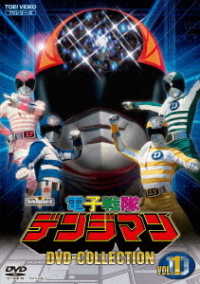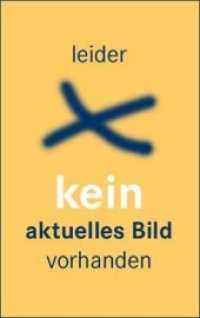- ホーム
- > 洋書
- > 英文書
- > Philosophy
Full Description
Salomo Friedlaender/Mynona (1871-1946) was a prominent, eccentric and influential figure in late Imperial Germany, Expressionism, Dadaism, and the Weimar Republic. He wrote and published works of philosophy, novels, parodies and satirical so-called grotesque tales, which he wrote under the pseudonym "Mynona"—the German word for anonymous, anonym, spelled backwards. Currently being rediscovered in his native language, F/M and his work are still generally unknown, and none of his philosophical texts have been translated.
The Critical Introduction to Salomo Friedlaender/Mynona: Twentieth-Century Performance Philosopher is the first English book introducing F/M's philosophical works. The volume includes three introductory framing chapters of historical context, contemporary relevance and pertinence to the performance philosophy of F/M. The book also contains original translations of select passages from his most significant philosophical texts: Schöpferische Indifferenz/Creative Indifference, (first published in 1918), the later Das magische Ich/The Magic I (1935) and his very last essay Ideenmagie/Idea Magic (1945/46), as well as translations of select correspondence with well-known cultural personalities of the time.
Recognised as having inspired Walter Benjamin, F/M was also a forerunner of both performance philosophy and gender theory, and a major influence in the development of Gestalt therapy. Furthermore, not only did F/M belong to the first generation of avid Nietzsche readers, but he was also a lifelong tireless interpreter of Immanuel Kant and Schopenhauer. F/M's extraordinary voice is of significant interest to Nietzsche and Kant Studies and sheds light on their respective relevance for a performance-oriented approach to philosophy.
Contents
Abbreviations
List of Illustrations
Part I: Keys to the Open Trove: Introducing Salomo Friedlaender/Mynona
Self-portrait, Salomo Friedlaender/MynonaFriedlaender/Mynona's Performative Philosophy: A Short Introduction, Alice LagaayThe Indifferentism of Polar Performance, Detlef ThielPart II: Which Knot Should We Use to Hold Him, the Old Shape-Shifting Proteus? Philosophical and Grotesque Pieces
The Wooer of Truth (1903)Four Texts on Theatre (1909-1901)Friedrich Nietzsche: An Intellectual Biography; Chapter VI: Thus Spoke Zarathustra (1911)Marionettes, Humans and Gods: On the Centenary of Heinrich von Kleist's Death (1911)Aerosophy (1911)Polarity: A Philosophical Lecture (1912)Carnival of Logic (1912)Towards a Profane Theology (1913)A Child's Heroic Deed (1913)Presentism (1913)The Middle between Extremes: Preventing a Misunderstanding (1913)Idea for a Telehaptor (1913)Once More: Polarity, or the Essence of Difference (1915)Trenko patrollo (sonnet, 1918)Part III: The Cult, Yet Largely Unread, Book: Creative Indifference (1918/1926, excerpts)
Preface to the Second Edition in Avowal of Allegiance to Immanuel Kant and Ernst MarcusPreambleTreatise 1 (First Part)Sketches: Ethics; Individual; Value; ColourAphorisms (Select Aphorisms)Part IV: Through the Magical I: Later Writings in Exile
The Flight of Love (1919)Grotesque (1919)The Antichrist and Ernst Bloch (1920)The Star Festival (1922)George Grosz (1922, selections)On the Occasion of Mynona's Hundredth Birthday (1928)Why did the Colour Teacher Goethe Discard the Colour Theory of the Goethean Schopenhauer? (1932)On Immortality: A conversation between an empiricist and the deceased Old-Kantian Ernst Marcus (1933)On World Ether: According to Immanuel Kant and Ernst Marcus (1934)The Laughing Job (1935)Spengler's Death (1936)The Magical I: Elements of Critical Polarism (1935, excerpts)Idea Magic (1945, excerpts)Library (sonnet, 1943)Jean-Paul Sartre's Existentialism (1946)Part V: The Air I Breathe: A Selection of Letters
To Paul Scheerbart (19 May 1904)To Martin Buber (2 August 1908)To Georg von Lukács (12 July 1911)To Hannah Höch & Tilit Brugman (1924-30)To Eduard W. Tieffenbach (20 September 1933)To Leo Ragolsky (13 April 1935)To Doris Hahn (14 June 1935)To Alfred Kubin (10 April 1936)To Anselm Ruest (13 September 1943)Part VI: Tool Chest of Reference Materials
On Ernst Marcus' Eccentric Sensation (Exzentrische Empfindung), Salomo Friedlaender/Mynona and Upton Sinclair:
Christoph Keller and Detlef Thiel in ConversationBiobibliography of Salomo Friedlaender/MynonaBibliography
Credits
About the Translators
Index








